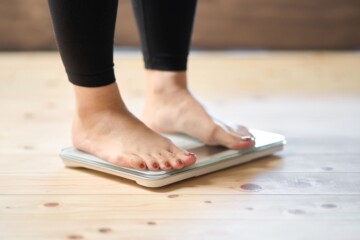Firstly, it is important to note that both external and internal factors can affect your mood. Our emotions are not totally governed by the workings in our body: our relationships, jobs and even climate can all have a serious impact on our mental state. This means that changes in mood and mental state are almost never the result of just one thing, and PCOS is no different.
Can PCOS cause mood swings?
Polycystic ovary syndrome (PCOS) is a condition believed to affect around 1 in 10 women in the UK. Women are diagnosed with PCOS when they are suffering from 2 out of the 3 following conditions:
- irregular or absent periods
- excess androgens (“male” hormones) in the body
- polycystic ovaries – usually revealed by an ultrasound scan
The exact cause of PCOS remains debated but the NHS state that “it is related to abnormal hormone levels in the body”. In regard to mood swings, you will often hear people say they’re feeling “hormonal”, the behaviour of adolescents is commonly attributed to the presence of hormones as well. So, what role do hormones play in human behaviour and how is that related to PCOS?
On the one hand, there is an argument that ladies with PCOS are less likely to be susceptible to “traditional” mood swings experienced among women. Premenstrual syndrome (PMS) is the most common cause of mood swings in women. It is estimated that 3 out of every 4 (reference) menstruating women have experienced PMS in some form. PMS is usually brought about from the fluctuations in hormones that occur naturally within a regular menstrual cycle. Some women with PCOS may not have a regular menstrual cycle. Consequently, these women are less likely to experience the symptoms of PMS because, although unbalanced, the hormone levels in PCOS women that are not having periods tend to remain more consistent.
However, just because ladies with PCOS are less likely to experience rapid changes to their hormone levels, it doesn’t mean that they are not susceptible to changes in mood. PCOS has a number of effects on the body which impact mental health and many ladies with PCOS suffer with mood swings.
Why does PCOS cause mood swings?
PCOS is closely associated with insulin resistance, where the body is resistant to the effects of insulin and therefore more insulin is produced. This leads a high amount of insulin in the bloodstream, which through a series of steps, results in your ovaries producing more testosterone and other androgens. The excess androgens, often described as “male hormones”, present in ladies with PCOS result in many of the physical symptoms of PCOS including hirsutism (unwanted hair growth), acne and male pattern baldness. Suffering from insulin resistance also has an adverse effect on weight, resulting in many ladies with PCOS being overweight and struggling to lose weight.
The body and the mind are intrinsically linked, and they both constantly affect one another so it can be a struggle for ladies with PCOS deal with these symptoms and they can result in feelings of hopelessness.
There is strong evidence to show that PCOS can have an adverse effect on mental health, a topic which we have covered before. A systematic review on anxiety and depression in PCOS concluded that “women with PCOS on average tend to experience mildly elevated anxiety and depression, significantly more than women without PCOS.”
Ladies with PCOS also often struggle in dealing with inflammation, this can lead to high cortisol levels which is closely associated with stress and depression
As PCOS isn’t fully understood, it is difficult to identify exactly why it makes women more susceptible to mood swings. However, mental health and PCOS are clearly related and should be considered as one of the important challenges to overcome for those diagnosed with PCOS.
How can I control my mood swings?
Healthy weight
If you have been reading a lot about PCOS, you will have seen this advice a lot of the time and it can be seriously irritating. The nature of the condition makes it very difficult for women to lose weight and often a normal healthy diet doesn’t have the same benefit as it does for those who don’t have PCOS. When you then look for help on your condition and are told to do something which your body is resistant to, it can be frustrating to say the least.
However, just because it is more difficult doesn’t make it impossible, you just need to have more discipline and more fight. That systematic review from earlier found that “women with PCOS with lower BMI tended to have slightly lower anxiety and depression scores”. On top of this, getting to a healthy weight can help to alleviate other symptoms of PCOS. This is why we always recommend getting your body to a healthy BMI. If you have struggled with diets in the past, we recommend a slow carb diet for ladies with PCOS.
Regular exercise
Exercising often helps with regulating a variety of hormones as well as with losing weight. An important thing to remember when exercising is that it doesn’t have to be intense. Moderate exercises like walking or yoga are great, just try your best to be consistent!
Inofolic Alpha
Inofolic Alpha helps ladies with PCOS. You can read more about how Inofolic Alpha has helped ladies with PCOS here.
How do you comfort someone with PCOS?
With lifestyle changes
One way to support a loved one who is battling PCOS is to change your diet and lifestyle alongside them. Providing this support can help provide motivation and discipline which can both wane when people feel they are battling alone.
Learn about the condition
Trying your best to understand about the condition will help you to be more empathetic. This understanding will leave you in the best position to be mindful of the way they might be feeling. There is good information on the NHS website, and we have written a lot about PCOS on Fertility Family. Additionally, you could ask to attend appointments with them if they wouldn’t mind.
Listen and be patient
s mentioned earlier, PCOS and mental health issues can go hand in hand. Be supportive and understanding if she is struggling with her self-esteem or mood. If necessary, support her decision to go and see a counsellor.








